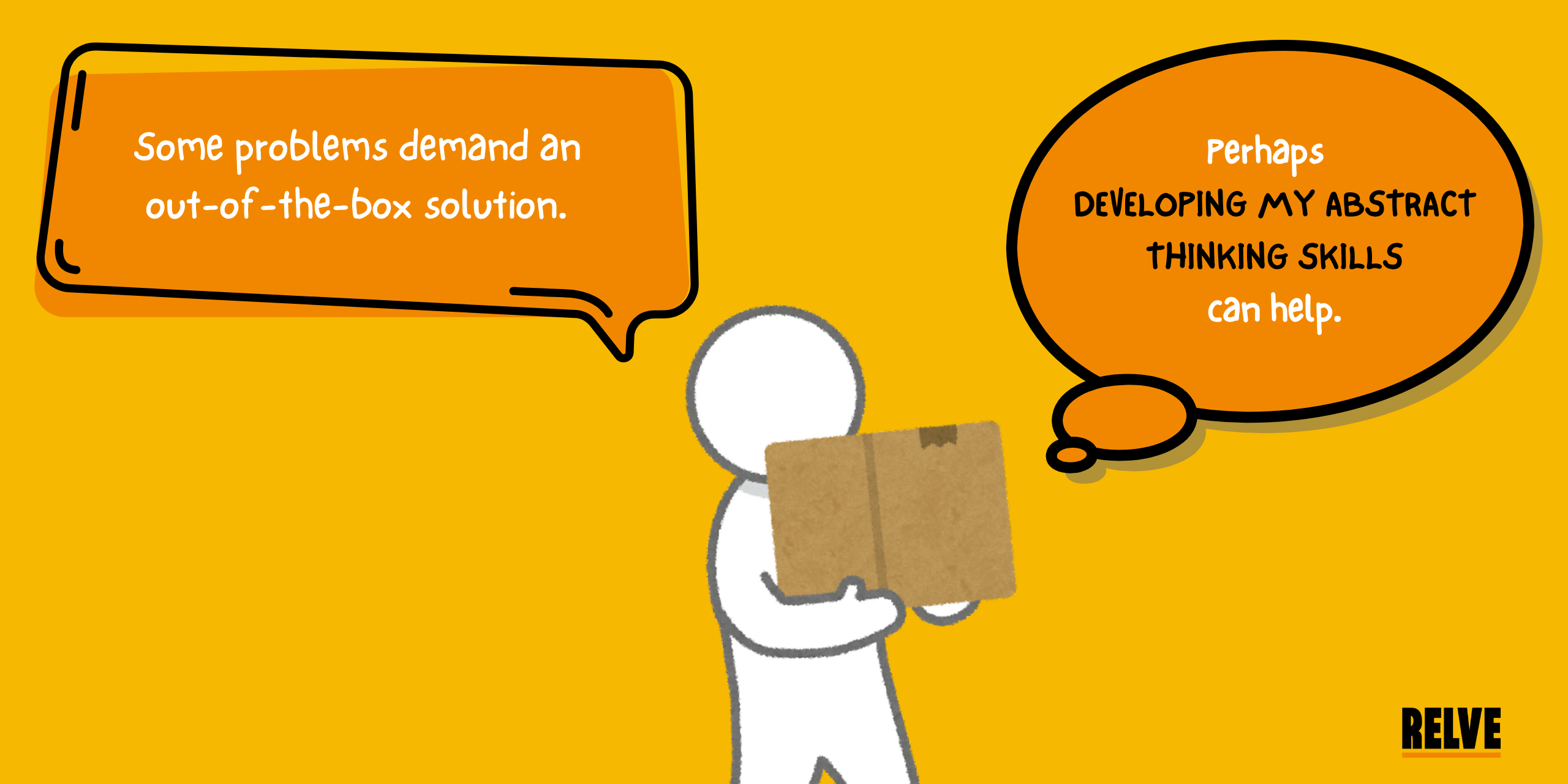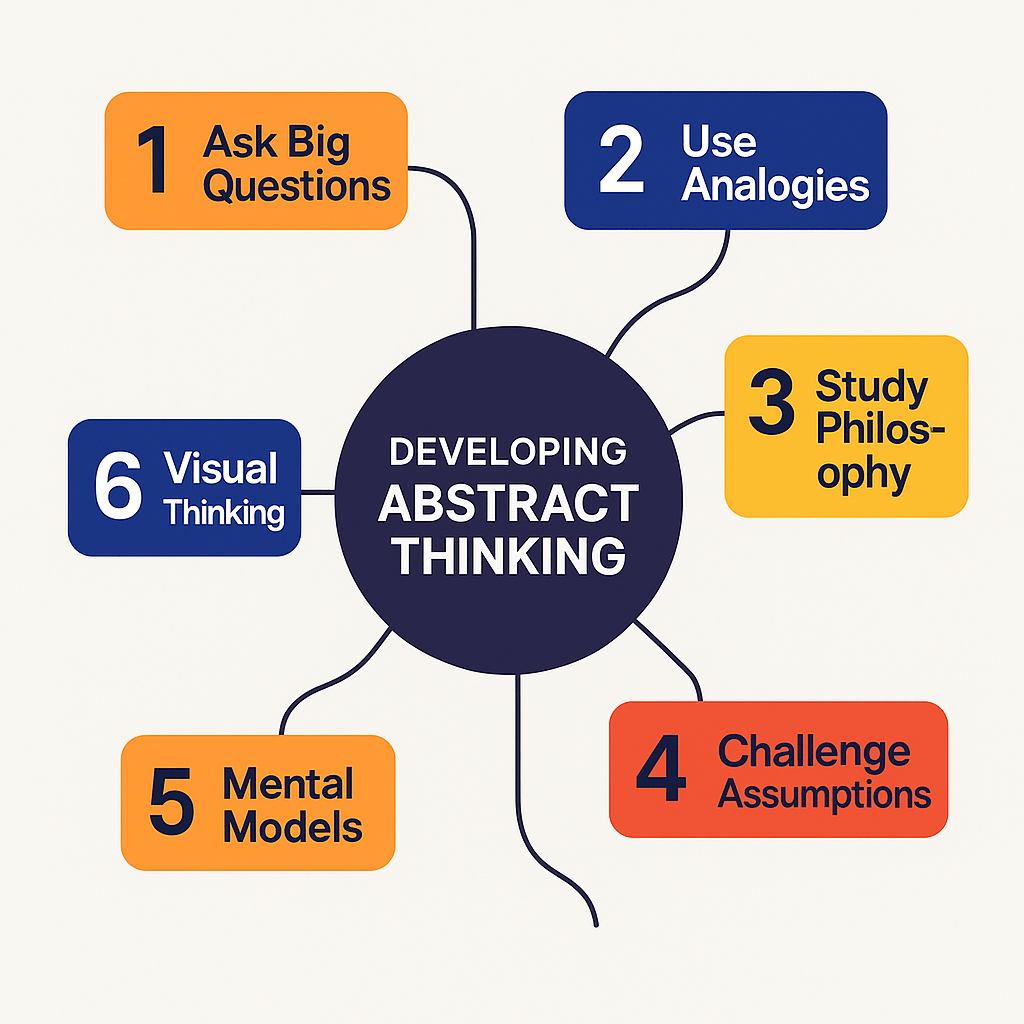
Do you ever find yourself stuck in a loop of problems, and your thoughts are moving in circles, unable to see the bigger picture? Don’t feel left out. Whether you are a professional navigating complicated business decisions, an entrepreneur trying to create a disruptive product, or a student brainstorming some out-of-the-box concepts. Developing abstract thinking skills is much more important than people think.
Abstract thinking is your bridge from what is… to what could be. It is the secret sauce of innovative leaders, strategic thinkers, designers, writers, engineers, and change-makers across various industries.
Now YOU will be thinking about how to become a better thinker. Don’t worry this guide can serve as your starting point!
Developing Abstract Thinking Skills: Definition
Abstract thinking is the ability to connect ideas, identify patterns, and make sense of concepts that are not tangible.
This skill allows you to:
🧠 What Abstract Thinking Skills Allow You to Do
| Skill | What It Enables You to Do |
|---|---|
| Conceptualization | See the big picture and connect ideas beyond surface-level details. |
| Pattern Recognition | Identify trends, relationships, and underlying structures in data or behavior. |
| Strategic Thinking | Anticipate future scenarios and plan long-term solutions accordingly. |
| Problem Solving | Generate innovative solutions by thinking beyond the obvious. |
| Metaphorical Thinking | Use analogies or models to explain complex concepts clearly. |
| Critical Reasoning | Evaluate ideas logically, assess risks, and make informed decisions. |
| Innovation | Combine unrelated ideas into novel concepts or products. |
You’re no longer just reacting – you’re thinking conceptually.
Why Do You Need Abstract Thinking in the Real World?
We live in a data-heavy, fast-paced environment. In such situations, conceptual agility is what differentiates great thinkers from average ones.
Here’s where abstract thinking becomes a competitive advantage:
- Problem Solving: You see root causes, not just symptoms.
- Innovation: You find ideas where others see noise.
- Leadership: You design systems instead of micromanaging steps with a strong focus on accountability.
- Communication: You distill complex ideas into compelling narratives.
- Career Growth: You become the go-to person for strategy and vision.
How to Develop Abstract Thinking Skills: Foundational Techniques
Let’s dive into practical ways you can start developing abstract thinking skills today.
Here is a step by step process:
1. Train Your Mind with Mental Models
Mental models are frameworks that help you simplify complexity. They come from psychology, economics, biology, and systems theory.
Try this:
- Pick one model a week and apply it to a current work/life situation.
- Journal your insights – observe how your mind stretches beyond usual assumptions.
2. Read Conceptually, Not Just Literally
Don’t just consume information – synthesize it. Abstract thinkers aren’t just readers – they’re idea hunters.
Books are helpful in unlocking new perspectives. The more you read, the more you notice interconnections, patterns, and systems – the playground of abstract thinkers.
3. Practice Lateral Thinking Techniques
Lateral thinking helps you escape rigid, linear thought patterns.
Try this lateral thinking technique
This approach doesn’t just enhance creativity – it builds cognitive flexibility, a core part of developing and applying abstract thinking skills.
4. Reflect on Big-Picture Patterns
Abstract thinkers constantly ask:
- What’s the larger pattern here?
- What system does this problem belong to?
- What am I not seeing?
Action Step:
Map out a recurring problem (workplace bottlenecks, team misalignment, customer drop-offs). Sketch it as a system, not just as a task list
5. Engage in Meaningful Conversations
Deep conversations stimulate abstract thinking. Discussing these things can help you discover new viewpoints and improve your decision-making skills for the better:
- Future trends
- Ethical dilemmas
- Hypotheticals (“What would happen if…?”)
- Cross-disciplinary ideas
These conversations train your brain to hold complexity, think beyond black-and-white answers, and develop layered viewpoints.
Use Mind Mapping and Conceptual Diagrams
Sometimes thinking abstractly requires visual aids like mind mapping techniques.

Mind maps help you:
- See associative connections
- Identify gaps in thinking
- Build conceptual clarity
Pro Tip:
Build a thinking map repository for your ideas over time. You’ll be amazed at how abstract patterns emerge across topics.
Solve Open-Ended Problems Regularly
Unlike yes/no questions, open-ended problems can develop divergent thinking patterns.
Examples:
- “How would you redesign education for the 22nd century?”
- “If humans colonize Mars, what economic systems would work best?”
- “How would you explain AI to a child and a policymaker in different ways?”
These types of open-ended challenges train your brain to build narratives and engage in symbolic reasoning – all pillars of how to develop abstract thinking skills.
From Thought to Action: Developing Abstract Thinking Skills
Now that you’ve learned how to develop and apply abstract thinking skills, let’s bring it to your daily life.
Try these habits:
- Ask deeper questions in meetings
- Reframe problems with metaphors
- Draw a systems map on whiteboards
- Keep a “thinking journal”
- Explore one mental model every week
- Run “what-if” drills in your team
And most importantly, teach others what you learn. Abstract thinking becomes concrete when you apply and explain it to others.
Developing Abstract Thinking Skills Let You Handle Conflicts Better
When you understand how people perceive, project, and process information differently, you become a more effective communicator and conflict resolver.
You step back and see the underlying structure of disagreements – not just the noise.
Conclusion: Think Beyond with Abstract Thinking Skills
Abstract thinking isn’t just a “nice to have.” It’s a game-changer in the way you lead, learn, work, and live. When you practice developing abstract thinking skills, you begin to:
- See beyond tasks – into systems
- Think beyond problems – into possibilities
- Communicate beyond words – into meaning
This is your invitation to go beyond the obvious – to grow, evolve, and transform not just how you think, but who you become.
Together, these aren’t just skills – they’re your personal and professional growth edge.